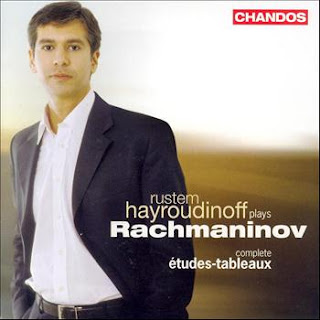 |
| Hamelin & Andsnes Image: www.goldstar.com |
The morning after, my head is still the worse for wear after encountering the juggernaut that is The Rite of Spring at nearly close enough quarters to cut its toenails. Stripped of its orchestral colour, performed on two pianos by a pair worthy of the label Two of Today's Greatest Living Pianists, Stravinsky's ballet comes over in x-ray clarity: the bones, muscles and sinews are as vivid as a dancer's, the workings of those shattering and shattered rhythms and the cruel, elemental crashes and crunches of multi harmonies steaming around you and boiling your blood, to say nothing of your eardrums. My God, it's a brutal, hideous thing, this vision of a tribe killing its pure and innocent young one. It's almost as if Stravinsky might have gone into a trance and predicted, unconsciously, the decades that were to follow.
The pianists responsible last night were Marc-André Hamelin and Leif Ove Andsnes, who took to the Wigmore Hall platform for a gritty programme - mostly Stravinsky, a bit of Debussy, plus Mozart as an opening amuse-bouche. I hear they first got together when Marc played in Leif Ove's festival, but however well you know their playing - and lots of piano fans know them both extremely well - you might not have guessed that they could turn out to be musical soulmates.
There are two basic ways to approach playing two-piano music, as with most chamber music. You can remain two individuals, exchanging and sparkling and making individual noises that point up the differences between you: this can work beautifully as a fun exchange, a conversation in which the performers are together yet still themselves. The other approach, which is much more difficult, is to fuse. To become one great machine with two keyboards, twenty fingers and two brains working as one. Hearing either of these two musicians alone, you might appreciate Andsnes's deep-velvet sound and forensic clarity of vision, or Hamelin's lyrical turns of phrase and super-cool supremacy over any technical challenge; yesterday, all were present, yet I doubt anyone would have been able to guess which was which from sound alone. They have much in common: a laid-back presence, a vaguely Nordic cool (Andsnes is from Norway, Hamelin from Canada) and a solid artistry that you can rely on with total confidence.
They opened with Mozart's Larghetto and Allegro in E flat, in the version completed by Paul Badura-Skoda - a lively, lyrical, often sublime miniature with challenges aplenty, through which they brought lyricism to the fore: calm rather than excitability prevailed. Stravinsky's Concerto for Two Pianos, written in the 1930s for the composer to perform with his son, Soulima, is more of a rarity and probably with good reason: it's a chunky creation to chew on, sometimes evoking the hewn-out blocks and soaring lines of art deco, or presenting heavy-duty fugal writing derived from late Beethoven (yes, really). Debussy's En blanc et noir is an often enigmatic creation, its abstract explorations of colour and timbre punctuated by a central movement that is a searing portrait of World War I emotional life complete with bugle calls, a heavy-footed Lutheran chorale and hints of distant gunfire - all of it conveyed with detailed brushstrokes and subtle, seamless blending by the two pianists, these veritable painters of sound.
And then, after the interval, the Rite. It was first heard on the piano when Stravinsky and Debussy played it through together. The critic Louis Laloy was there:
“Stravinsky asked if he could take his collar off. His
sight was not improved by his glasses, and pointing his nose to the keyboard
and sometimes humming a part that had been omitted from the arrangement, he led
into a welter of sound the supple, agile hands of his friend. Debussy followed
without a hitch and seemed to make light of the difficulty. When they had
finished there was no question of embracing, nor even of compliments. We were
dumbfounded, overwhelmed by this hurricane which had come from the depths of
the ages and which had taken life by the roots.”
104 years later: yes, exactly.
Two Stravinsky encores - a tango and the Circus Polka - lightened the mood if not the language. I think that's quite enough Stravinsky for a little while.






